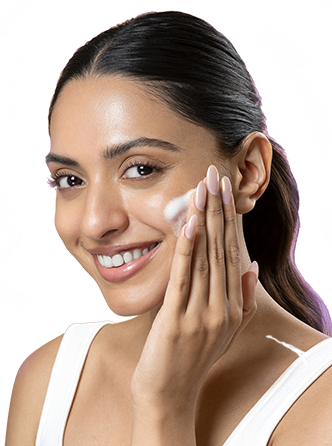IN THIS ARTICLE
If you've had doubts about the importance of sunscreen usage, we don't blame you. After all, there are many questions and doubts surrounding sunscreens that are often left unanswered.
What are the best sunscreens for everyday use? Should you wear sunscreens on a cloudy day, how to apply sunscreens, and which sunscreen is the best, are some of the questions that you might have when you plan to apply them.
Not anymore! Here is a comprehensive guide on the importance of sunscreens with all your questions answered. Also, find the tips to find the best sunscreens for everyday use.
Why do you need to apply sunscreen every day?
Ah, the age-old question: to sunscreen or not to sunscreen?
Do you think protecting your delicate skin from harmful UV rays is excessive? Trust us, it’s not. Because then, you can start a journey to a wrinkle-free skin.
Think of sunscreen as the little black dress of skincare - it's timeless, versatile, and always in style. Plus, it's the ultimate multi-tasker, protecting your skin from premature aging, sunburn, and even skin cancer.
So, don't be fooled by those who say sunscreen is excessive. You don't have to be on a beach vacation to need it - even a quick trip to the grocery store can expose your skin to harmful UV rays. Remember, every day is a good day to wear sunscreen.
So, slather on that sunscreen and let your skin bask in the glory of protection. After all, nothing says "chic" quite like a healthy dose of sunscreen.
Benefits of Sunscreen
If you like a little sun on your skin, you might be basking in its warm glow without realizing the harm it can cause to your skin. This is where sunscreen comes in - a lifesaver for anyone who wants to enjoy the sunshine without sacrificing their skin's health. Here are some of the benefits of using sunscreen daily:
-
It protects you against harmful sun rays
Sunscreen protects your skin from harmful UVA and UVB rays that can cause sunburn, dark spots, redness, and even skin cancer. In other words, it's like a superhero cape that shields your skin from danger!
-
It helps prevent premature aging
Sunscreen can help reduce premature aging caused by the sun. It's like a time machine that keeps your skin looking young and fresh.
-
It helps prevent sunburn.
No one likes the feeling of sunburn– the way your skin turns red, tender, and painful. But with the regular use of sunscreens, you can avoid that unpleasant experience altogether.
-
It can improve skin’s health and even out your skin tone
When you wear sunscreens, daily, you need not worry about patchy skin or unwanted dark spots. - just smooth, glowing skin all over!
-
It comes in various forms
Do you think sunscreens are sticky? Not anymore. Sunscreens today are available in various forms and consistencies, from sprays, sticks, and lightweight lotions that are easy to blend and suitable for all skin types. There's no excuse not to use it!
How to choose the right sunscreen
To get the best sunscreen for everyday use, you need to understand how to choose the right one. We'll guide you through the key factors to consider when selecting the best sunscreen for face and body.
1. Look for filters and broad-spectrum protection
When selecting a sunscreen, the first thing you should look for is broad-spectrum protection. Broad-spectrum sunscreens protect against both UVA and UVB radiation. UVA rays can cause premature aging and wrinkles, while UVB rays are responsible for sunburn. Make sure your sunscreen is labelled as broad spectrum to ensure you are protected against both types of UV radiation. Moreover, look for added features like blue light protection and new-gen filters for complete protection.
2. Consider the SPF
SPF stands for Sun Protection Factor and refers to how effectively a sunscreen protects against UVB radiation. The higher the SPF number, the more protection the sunscreen provides. However, it's important to note that no sunscreen can offer 100% protection against UV radiation. SPF 35 blocks approximately 97% of UVB rays and SPF 50 blocks approximately 98% of UVB rays.
An SPF 50 is recommended for everyday use. However, if you need sunscreen for extremely acne-prone or oily skin or are not likely to be exposed to any direct sun exposure, you can also opt for a lower dose of filters, like SPF 35.
3. Choose the right type of sunscreen
There are three main types of sunscreens: chemical, physical, and hybrid. Chemical filters absorb UV rays, while physical filters reflect them. Chemical and hybrid sunscreens are typically easier to apply and are often more lightweight, while physical sunscreens tend to be thicker and can leave a white cast on the skin.
Moreover, encapsulated chemical filters enable a lightweight, non-greasy texture and ensure longer-lasting protection, which makes it an ideal ingredient in sunscreen for oily skin. Consider your skin type and preferences when selecting the right type of sunscreen for you.
4. Look for additional benefits
Many sunscreens also offer additional benefits, such as moisturizing ingredients, hybrid protection, or safe new-generation filters. Look for sunscreens that offer these additional benefits to maximize your protection and skincare routine.
5. Consider your skin type
Finally, consider your skin type when selecting a sunscreen. If you have oily or acne-prone skin, you may want to look for a lightweight formula. Also look for ingredients that help balance sebum and soothe inflammations, like green tea, cica. If you have dry or sensitive skin look for a sunscreen that offers additional moisturizing benefits, or use an SPF cream that suit all skin types.
Other ways to protect skin
Sunscreen is an important tool for protecting your skin from the harmful effects of the sun, but it's not the only way. Here are some additional ways to protect your skin:
-
Seek shade:
When possible, stay in the shade to reduce your exposure to UV radiation. This is especially important during peak sun hours, which are typically between 10 a.m. and 4 p.m.
-
Wear protective clothing:
Wearing protective clothing, such as long-sleeved shirts, pants, and hats, can help shield your skin from the sun. Look for clothing with a tight weave and dark colors, which provide more protection.
-
Wear sunglasses:
Sunglasses protect your eyes from UV radiation and can also help protect the delicate skin around your eyes.
-
Stay hydrated:
Drinking plenty of water helps keep your skin hydrated and healthy.
-
Use skincare products with antioxidants:
Antioxidants, such as Vitamin C, E, and green tea can help protect your skin from free radicals, which can damage your skin cells and cause premature aging.
-
Don't forget to moisturize:
Keeping your skin moisturized helps maintain its barrier function and can help protect it from environmental damage.
Takeaway
Wearing sunscreen every day is essential for protecting your skin from the harmful effects of the sun's UV radiation, provided you use it in the right manner.
Sun damage can cause premature aging, wrinkles, and an increased risk of skin cancer.
It's important to choose a broad-spectrum sunscreen with an SPF of 30 or higher and to apply it generously and frequently.
Additionally, incorporating other protective measures such as seeking shade, wearing protective clothing and sunglasses, and using skincare products with antioxidants can further protect your skin from damage.
By making sunscreen a part of your daily skin care routine, you can help keep your skin healthy, youthful, and protected for years to come.
FAQs
1. Which sunscreen is best for the face?
The best sunscreens are the ones that have features like a broad spectrum, PA +++, SPF 35 and above and are infused with hydrating ingredients. Ensure to read the labels carefully while choosing the best sunscreens for your face.
2. Which sunscreen is best for everyday use?
For everyday use, you must choose a sunscreen that has an SPF of 35 and above. It should be lightweight, non-greasy, easy to blend, and leaves no white cast. Additional features like new-gen UV filters, antioxidants, and long-lasting sun protection are always a plus.
3. Can we use sunscreen daily?
Yes, you can use sunscreens daily. Daily application of sunscreen protects your skin against the harmful effects of the sun to keep it healthy and youthful.



























